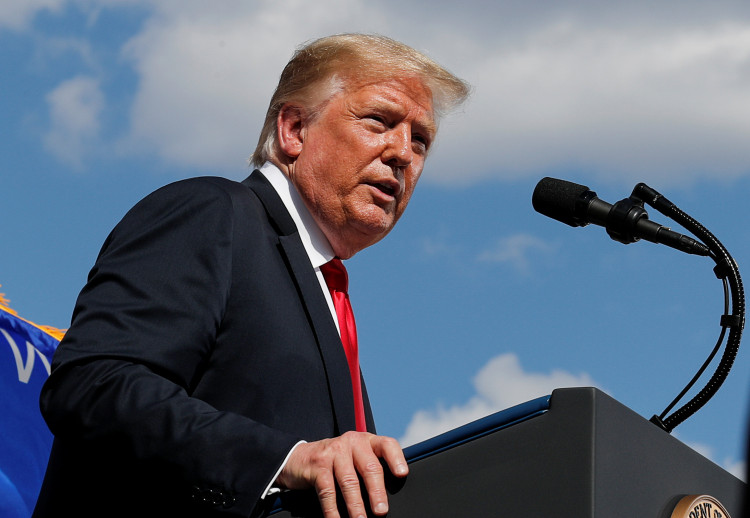President Donald Trump said Sunday that he remains committed to the U.S. "buying and owning" Gaza, despite mounting international criticism of his proposal to take control of the war-ravaged territory. Speaking to reporters aboard Air Force One en route to the Super Bowl in New Orleans, Trump stated that while the U.S. would oversee Gaza, Middle Eastern nations could play a role in rebuilding it.
"I'm committed to buying and owning Gaza," Trump said. "As far as us rebuilding it, we may give it to other states in the Middle East to build sections of it, other people may do it, through our auspices. But we're committed to owning it, taking it, and making sure that Hamas doesn't move back."
Trump's remarks follow his controversial announcement last week that the U.S. would assume control of Gaza once Palestinians were resettled in other countries. The plan, which envisions clearing Gaza and rebuilding it with U.S. oversight, has drawn sharp criticism from Palestinian officials and key Middle Eastern nations, including Saudi Arabia and Jordan.
Middle Eastern Leaders Reject U.S. Takeover Plan
Saudi Arabia has categorically rejected Trump's proposal, while Jordan's King Abdullah II is reportedly set to confront the U.S. president about the plan during their scheduled meeting on Tuesday. Jordanian officials have described the proposal as a "recipe for radicalism" that could destabilize the region and threaten Jordan's peace treaty with Israel.
Trump's assertion that the U.S. would assume control of Gaza has also sparked opposition from Palestinian leaders. The Palestinian Authority's foreign ministry stated: "The rights of our people and our land are not for sale, exchange or bargaining." Hamas, which governs Gaza and is designated as a terrorist organization by the U.S., Israel, and several other nations, denounced the idea as "absurd."
"Gaza is not a property to be sold and bought. It is an integral part of our occupied Palestinian land," Hamas official Izzat al-Rishq said in a statement.
Netanyahu Backs Trump's Proposal
While Middle Eastern states have largely opposed Trump's plan, Israeli Prime Minister Benjamin Netanyahu praised it as a "revolutionary and creative" alternative to the widely discussed post-war governance proposals that have centered on Palestinian control.
"For a full year, we have been told that on the 'day after,' the PLO [Palestine Liberation Organization], the Palestinian Authority, needs to be in the Strip," Netanyahu said at a cabinet meeting Sunday. "President Trump came with a completely different vision, much better for the State of Israel, a revolutionary and creative vision, which we are discussing. He is very determined to carry it out. This also opens many possibilities before us."
International Legal Concerns Over Forced Displacement
Trump's plan has also raised legal and humanitarian concerns. The United Nations has warned that the forced displacement of Palestinians would violate international law, with the UN human rights office stating that any mass deportation from occupied territory is strictly prohibited.
Palestinians have expressed fears that the proposal echoes the Nakba, or "catastrophe," when hundreds of thousands were displaced during the 1948 war that followed Israel's creation. Many of those refugees settled in Gaza, where they and their descendants now make up the vast majority of the population.
Germany's Chancellor Olaf Scholz condemned Trump's proposal, calling it a "scandal" and saying: "The relocation of a population is unacceptable and against international law."
Gaza's Devastation and Humanitarian Crisis
The conflict between Israel and Hamas has left Gaza in ruins. More than 48,000 people have been killed since Israel launched its military campaign in response to Hamas' Oct. 7, 2023, attack, according to the Hamas-run health ministry. Nearly 70% of the enclave's buildings have been destroyed or damaged, leaving much of the population displaced. Essential services, including healthcare and sanitation, have collapsed, and shortages of food, fuel, and medicine have worsened the humanitarian crisis.
Trump has insisted that those displaced from Gaza "don't want to go back" and has suggested that Jordan, Egypt, and other Arab nations should accept Palestinian refugees. Jordan and Egypt have repeatedly rejected such proposals.
Next Steps: U.S. Negotiations with Arab Leaders
As Trump pushes ahead with his proposal, he is set to meet with Jordan's King Abdullah II, Egyptian President Abdel Fattah el-Sisi, and Saudi Crown Prince Mohammed bin Salman in the coming days. Israeli President Isaac Herzog emphasized the importance of consulting regional leaders before moving forward.
"These are partners that must be listened to, they must be discussed with. We have to honor their feelings as well and see how we build a plan that is sustainable for the future," Herzog told Fox News on Sunday.
Palestinian officials and Arab states have also condemned comments made by Netanyahu in a recent television interview, where he suggested Palestinians could be relocated to Saudi Arabia. The Egyptian government called Netanyahu's remarks "reckless," while Saudi Arabia on Sunday welcomed the strong rejection by allied nations of Benjamin Netanyahu's remarks on the "displacement of the Palestinian people from their land."






